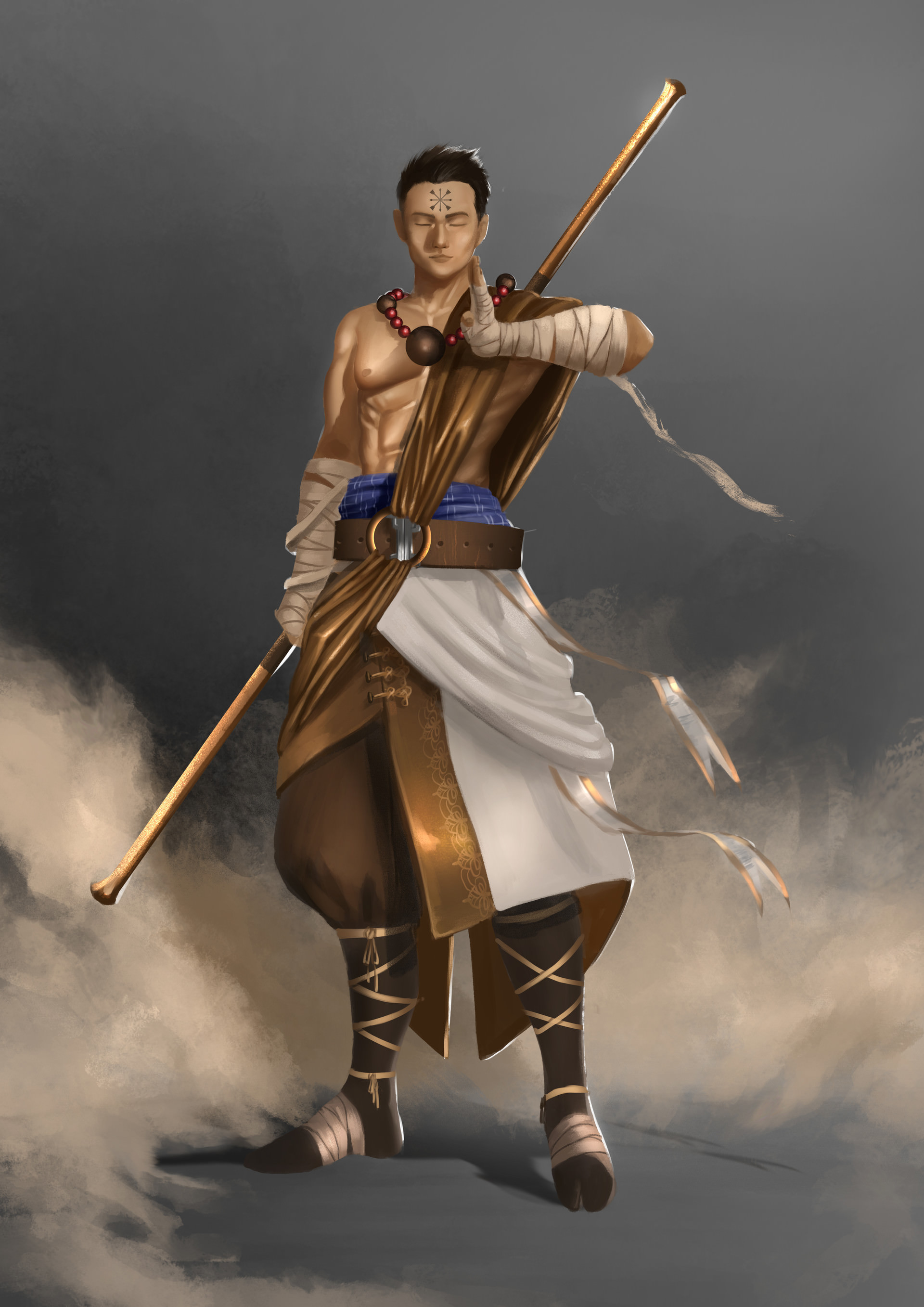The Airbender
"Air is the element of freedom. The Air Nomads detached themselves from worldly concerns and found peace and freedom. Also, they apparently had pretty good senses of humor." - Iroh, the Dragon of the West, 100 AG.
Air Nomads generally espouse a philosophy of conflict avoidance and respect for all forms of life; an airbender will never seek a fight, and they will never seek to strike an opponent directly. This accounts for airbending's emphasis on defensive maneuvers and its apparent lack of fatal finishing attacks. Due to the spirituality of the Air Nomads in accordance with the size of its population, every Air Nomad retains bending abilities, though their skills can deteriorate if they lose this spiritual awareness.
The Air Nomads have the smallest population but the most increased spirituality, while benders, in general, make up only a small percentage of the larger, more populous nations.
Airbenders emphasize intuition and imagination; to an airbender, there is always another path to take, as air flows wherever it can. This makes airbending the most dynamic of all the bending arts, and air itself is considered to be the element of freedom.
The Power of Enlightenment
Airbending, one of the four elemental bending arts, is the aerokinetic ability to control and manipulate air. The peaceful Air Nomads utilized this type of bending in their everyday lives. Air is the element of freedom. The Air Nomads detached themselves from worldly problems and concerns; finding peace and freedom was the key to solving their difficulties in life. Airbenders continually sought spiritual enlightenment, and, as a result, all children born into the Air Nomads were benders. The first airbenders learned their art from the flying bison.
Discipline
The key to airbending is flexibility and finding and following the path of least resistance. Airbending is notable for being almost purely defensive, as well as the most dynamic of the four bending arts. Airbenders can overwhelm many opponents at once with large and powerful attacks that could prove fatal; however, due to the pacifist nature of the Air Nomads, such attacks are rarely used. Instead, an airbender strives to use the opponents' energy against them. Due to their aforementioned spirituality, they often adapt to the situation surrounding them and employ negative jing, preferring evasive maneuvers as opposed to direct confrontation.
Life is Sacred
Though deemed the most dynamic of the bending arts, the most controversial aspect of airbending is its supposed lack of fatal moves, being a more defense-inclined art. This aspect in itself is a reflection of the principles held by the Air Nomads, which preaches the preciousness of all life and avoidance of violence whenever possible and who were, apart from the Avatar and prior to Harmonic Convergence, the only people to possess the ability.




Made with GM Binder
Image by: Caio Santos
Stains by: u/AeronDrake
This is unofficial Fan Content permitted under the Fan Content Policy. Not approved/endorsed by Wizards/Nickelodeon. Portions of the materials used are property of Wizards of the Coast and Nickelodeon. ©Nickelodeon ©Wizards of the Coast LLC.
Class Features
As an Airbender, you gain the following class features.
Hit Points
- Hit Dice: 1d8 per level
- Hit Points at 1st Level: 8 + your Constitution modifier
- Hit Points at Higher Levels: 1d8 (or 5) + your Constitution modifier per level after 1st
Proficiencies
- Armor: None
- Weapons: Simple weapons, blowguns
- Tools: Choose one type of artisan's tools or one musical instrument
- Saving Throws: Dexterity, Wisdom
- Skills: Choose two from Acrobatics, History, Insight, Perception, Religion
Equipment
You start with the following equipment, in addition to the equipment granted by your background:
- any simple weapon
- (a) a blowgun with 10 darts or (b) a quarterstaff
- (a) a dungeoneer's pack, (b) an explorer's pack, or (c) a priest's pack
Unarmored Defense
Beginning at 1st level, while you are wearing no armor and not wielding a shield, your AC equals 10 + your Dexterity modifier + your Wisdom modifier.
Martial Arts
At 1st level, your practice of martial arts gives you mastery of airbending combat styles that use unarmed strikes and monk weapons, which are any simple bludgeoning melee weapons that don't have the two-handed or heavy property.
You gain the following benefits while you are unarmed or wielding only monk weapons and you aren't wearing armor or wielding a shield:
- You can use Dexterity instead of Strength for the attack and damage rolls of your unarmed strikes and monk weapons.
- You can roll a d4 in place of the normal damage of your unarmed strike or monk weapon. This die changes as you gain levels, as shown in the Martial Arts column of the Airbending table.
- When you use the Attack action with an unarmed strike or a monk weapon on your turn, you can make one unarmed strike as a bonus action. For example, if you take the Attack action and attack with a quarterstaff, you can also make an unarmed strike as a bonus action, assuming you haven't already taken a bonus action this turn.
Ki
Starting at 2nd level, your training allows you to harness the mystic energy of ki. Your access to this energy is represented by a number of ki points. Your monk level determines the number of points you have, as shown in the Ki Points column of the Monk table.
You can spend these points to fuel various ki features. You start knowing three such features: Flurry of Blows, Patient Defense, and Step of the Wind. You learn more ki features as you gain levels in this class.
When you spend a ki point, it is unavailable until you finish a short or long rest, at the end of which you draw all of your expended ki back into yourself. You must spend at least 30 minutes of the rest meditating to regain your ki points.
Some of your ki features require your target to make a saving throw to resist the feature's effects. The saving throw DC is calculated as follows:
Ki save DC = 8 + your proficiency bonus + your Wisdom modifier
- Flurry of Blows. Immediately after you take the Attack action on your turn, you can spend 1 ki point to make two unarmed strikes as a bonus action.
- Patient Defense. You can spend 1 ki point to take the Dodge action as a bonus action on your turn.
- Step of the Wind. You can spend 1 ki point to take the Disengage or Dash action as a bonus action on your turn, and your jump distance is doubled for the turn.
Unarmored Movement
Starting at 2nd level, your speed increases by 10 feet while you are not wearing armor or wielding a shield. This bonus increases when you reach certain monk levels, as shown in the Airbending table.
At 9th level, you gain the ability to move along vertical surfaces and across liquids on your turn without falling during the move, as well as utilize airbending-assisted flight to gain a flying speed equal to your walking speed. If you attack while flying, you must land before the end of your turn or begin to fall.
Open Hand Technique
Starting at 3rd level, you can manipulate your enemy's ki when you harness your own. Whenever you hit a creature with one of the attacks granted by your Flurry of Blows, you can impose one of the following effects on that target:
- It must succeed on a Dexterity saving throw or be knocked prone.
- It must make a Strength saving throw. If it fails, you can push it up to 15 feet away from you.
- It can't take reactions until the end of your next turn.
Spell Slots per Spell Level
The Airbender
| Level | Proficiency Bonus | Features | Martial Arts | Ki Points | Unarmored Movement | 1st | 2nd | 3rd | 4th | 5th |
|---|---|---|---|---|---|---|---|---|---|---|
| 1st | +2 | Unarmored Defense, Martial Arts | 1d4 | — | — | — | — | — | — | — |
| 2nd | +2 | Ki, Spellcasting, Unarmored Movement | 1d4 | 2 | +10 ft. | 2 | — | — | — | — |
| 3rd | +2 | Patience, Open Hand Technique, Deflect Missiles | 1d4 | 3 | +10 ft. | 3 | — | — | — | — |
| 4th | +2 | Ability Score Improvement, Slow Fall | 1d4 | 4 | +10 ft. | 3 | — | — | — | — |
| 5th | +3 | Extra Attack | 1d4 | 5 | +15 ft. | 4 | 2 | — | — | — |
| 6th | +3 | Wholeness of Body, Breath of the Wind | 1d6 | 6 | +15 ft. | 4 | 2 | — | — | — |
| 7th | +3 | Evasion, Stillness of Mind | 1d6 | 7 | +15 ft. | 4 | 3 | — | — | — |
| 8th | +3 | Ability Score Improvement | 1d6 | 8 | +15 ft. | 4 | 3 | — | — | — |
| 9th | +4 | Unarmored Movement improvement | 1d6 | 9 | +15 ft. | 4 | 3 | 2 | — | — |
| 10th | +4 | Purity of Body | 1d6 | 10 | +20 ft. | 4 | 3 | 2 | — | — |
| 11th | +4 | Tranquility | 1d8 | 11 | +20 ft. | 4 | 3 | 3 | — | — |
| 12th | +4 | Ability Score Improvement | 1d8 | 12 | +20 ft. | 4 | 3 | 3 | — | — |
| 13th | +5 | Tongue of the Sun and Moon | 1d8 | 13 | +20 ft. | 4 | 3 | 3 | 1 | — |
| 14th | +5 | Diamond Soul | 1d8 | 14 | +25 ft. | 4 | 3 | 3 | 1 | — |
| 15th | +5 | Timeless Body | 1d8 | 15 | +25 ft. | 4 | 3 | 3 | 2 | — |
| 16th | +5 | Ability Score Improvement | 1d8 | 16 | +25 ft. | 4 | 3 | 3 | 2 | — |
| 17th | +6 | One with the Wind | 1d10 | 17 | +25 ft. | 4 | 3 | 3 | 3 | 1 |
| 18th | +6 | Empty Body | 1d10 | 18 | +30 ft. | 4 | 3 | 3 | 3 | 1 |
| 19th | +6 | Ability Score Improvement | 1d10 | 19 | +30 ft. | 4 | 3 | 3 | 3 | 2 |
| 20th | +6 | Perfect Self | 1d10 | 20 | +30 ft. | 4 | 3 | 3 | 3 | 2 |
Spellcasting
By 2nd level, you have learned to draw on more powerful bending techniques through meditation and wholeness of body and mind. See Spells Rules for the general rules of spellcasting and the Spells Listing for the Airbending spell list.
Preparing and Casting Spells
The Airbending table shows how many spell slots you have to cast your spells. To cast one of your spells of 1st level or higher, you must expend a slot of the spell's level or higher. You regain all expended spell slots when you finish a long rest.
You prepare the list of Airbending spells that are available for you to cast, choosing from the Airbending spell list. When you do so, choose a number of Airbending spells equal to your Wisdom modifier + half your level, rounded down (minimum of one spell). The spells must be of a level for which you have spell slots.
For example, if you are 5th-level, you have four 1st-level and two 2nd-level spell slots. With a Wisdom of 14, your list of prepared spells can include four spells of 1st or 2nd level, in any combination. If you prepare the 1st-level spell, you can cast it using a 1st-level or a 2nd-level slot. Casting the spell doesn't remove it from your list of prepared spells.
You can change your list of prepared spells when you finish a long rest. Preparing a new list of Airbending spells requires time spent in meditation: at least 1 minute per spell level for each spell on your list.
Spellcasting Ability
Wisdom is your spellcasting ability for your spells, since their power derives from your wholeness of self. You use your Wisdom whenever a spell refers to your spellcasting ability. In addition, you use your Wisdom modifier when setting the saving throw DC for a spell you cast and when making an attack roll with one.
Spell save DC = 8 + your proficiency bonus +
your Wisdom modifier
Spell attack modifier = your proficiency bonus +
your Wisdom modifier
Patience
Starting at 3rd level, while you are dodging, you gain a +3 bonus to AC.
Deflect Missiles
Starting at 3rd level, you can use your reaction to deflect or catch the missile when you are hit by a ranged attack. When you do so, the damage you take from the attack is reduced by 1d10 + your Dexterity modifier + your monk level.
Ability Score Improvement
When you reach 4th level, and again at 8th, 12th, 16th, and 19th level, you can increase one ability score of your choice by 2, or you can increase two ability scores of your choice by 1. As normal, you can't increase an ability score above 20 using this feature.
Slow Fall
Beginning at 4th level, you can use your reaction when you fall to reduce any falling damage you take by an amount equal to five times your Airbender level.
Extra Attack
Beginning at 5th level, you can attack twice, instead of once, whenever you take the Attack action on your turn.
Wholeness of Body
At 6th level, you gain the ability to heal yourself. As an action, you can regain hit points equal to three times your monk level. You must finish a long rest before you can use this feature again.
Evasion
At 7th level, your instinctive agility lets you dodge out of the way of certain area effects, such as a blue dragon's lightning breath or a fireball. When you are subjected to an effect that allows you to make a Dexterity saving throw to take only half damage, you instead take no damage if you succeed on the saving throw, and only half damage if you fail.
Stillness of Mind
Starting at 7th level, you can use your action to end one effect on yourself that is causing you to be charmed or frightened.
Purity of Body
At 10th level, your mastery of the ki flowing through you makes you immune to disease and poison.
Tranquility
Beginning at 11th level, you can enter a special meditation that surrounds you with an aura of peace. At the end of a long rest, you gain the effect of a Sanctuary spell that lasts until the start of your next long rest (the spell can end early as normal). The saving throw DC for the spell equals 8 + your Wisdom modifier + your proficiency bonus.
Tongue of the Sun and Moon
Starting at 13th level, you learn to touch the ki of other minds so that you understand all spoken languages. Moreover, any creature that can understand a language can understand what you say.
Diamond Soul
Beginning at 14th level, your mastery of ki grants you proficiency in all saving throws.
Timeless Body
At 15th level, your ki sustains you so that you suffer none of the frailty of old age, and you can't be aged magically. You can still die of old age, however. In addition, you no longer need food or water.
One with the Wind
At 17th level, you can relinquish all attachments to the material plane and become one with the wind. As a bonus action, you assume an ascended form, which grants the following benefits:
- You have resistance to all damage.
- You have a fly speed equal to your walking speed and can hover.
- You can move through other creatures and objects as if they were difficult terrain. You take 5 force damage if you end your turn inside an object. This benefit lasts for 1 minute. You cannot use it again until you complete a long rest.
Empty Body
Beginning at 18th level, you can use your action to spend 4 ki points to become invisible for 1 minute. During that time, you also have resistance to all damage but force damage.
Additionally, you can spend 8 ki points to cast the Astral Projection spell, without needing material components. When you do so, you can't take any other creatures with you.
Perfect Self
At 20th level, when you roll for initiative and have no ki points remaining, you regain 4 ki points.
Airbender Spell List
1st Level
- Absorb Elements xge
- Comprehend Languages
- Detect Good and Evil
- Detect Poison and Disease
- Expeditious Retreat
- Feather Fall
- Tenser's Floating Disk
- Jump
- Longstrider
- Protection from Good and Evil
- Sanctuary
2nd Level
- Calm Emotions
- Gust of Wind
- Levitate
- Pass Without Trace
- Silence
- Warding Wind xge
3rd Level
- Beacon of Hope
- Haste
- Magic Circle
- Haste
- Slow
- Wind Wall
4th Level
- Aura of Purity
- Divination
- Freedom of Movement
- Otiluke's Resilient Sphere
5th Level
- Commune
- Conjure Elemental
- Control Windsxge
- Dispel Evil and Good
- Greater Restoration
- Hallow
- Scrying
- Telekinesis
.
.
Made with GM Binder
Image by: Bloodivoe
Stains by: u/AeronDrake















